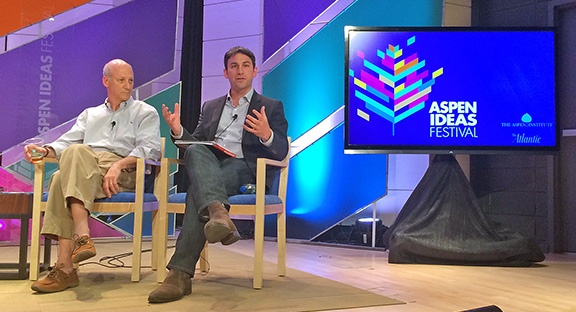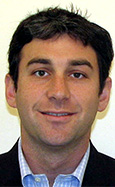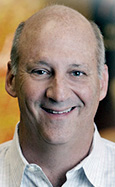Gates official: U.N. millenium goals to give way to sustainable goals
June 27, 2014 | 05:26 PM
 Ronald Shaich, CEO of Panera Bread, left, and Josh Lozman, deputy director of advocacy for the Bill & Melinda Gates Foundation, discuss how to nourish a world population of 9 billion people by 2050 at the Aspen Ideas Festival. (Jerry Hagstrom/The Hagstrom Report)
Ronald Shaich, CEO of Panera Bread, left, and Josh Lozman, deputy director of advocacy for the Bill & Melinda Gates Foundation, discuss how to nourish a world population of 9 billion people by 2050 at the Aspen Ideas Festival. (Jerry Hagstrom/The Hagstrom Report)ASPEN, Colo. — Its millennium development goals are set to expire in 2015, but the United Nations is developing a new set of “sustainable development goals” — and those goals should include agricultural development, a key official from the Bill & Melinda Gates Foundation said here Thursday at the Aspen Ideas Festival Spotlight on Health conference.

Josh Lozman
Josh Lozman, the deputy director for program advocacy at the Gates Foundation, said that when the millennium goals were established, many people derided them as a statement from international bureaucracy.
But Lozman said the goals have been surprisingly effective.
“Those goals have become a scorecard for the world,” he said. “It is very easy to look at the U.N. doing this and say it won’t mean anything. What we have learned is that it meant a lot, it has been an accountability method.”
But Lozman faulted the millennium goals because “agriculture is mentioned nowhere in those goals. And agriculture is the largest lever to reduce poverty.”
The Gates Foundation has made agriculture its biggest global program “because agriculture is the path out of poverty,” he said, noting that the foundation is working to get agriculture included in the sustainable development goals now being developed.
He noted that the Gates Foundation programs “start from the perspective of a smallholder farmer, typically a woman who is farming on a small plot of land.”
Speaking on a panel discussing “How do we nourish 9 billion people?,” Lozman said the world “cannot be fed without investing in these farmers.” Projections call for the global population to reach 9 billion by 2050.
The panel, moderated by former Agriculture Secretary Dan Glickman, discussed a variety of approaches to increase global food production.
Lozman noted that the Gates Foundation is backing research using genetic modification to develop a more nutritious banana for Uganda, where bananas are the main source of food.
But he noted that at present, Uganda would not allow genetically modified bananas to be planted. He said the debate over genetic modification is too much dominated by the United States and the European Union and that it should be a “Uganda-driven” debate.

Ronald Shaich
Ronald Shaich, CEO of Panera Bread, said he believed everyone on the panel could agree that labeling of genetically modified foods would be acceptable, but Glickman said he was “not sure about that.”
▪ United Nations — Millennium Development Goals and Beyond 2015: Overview
▪ — News on Post-2015 Development Process